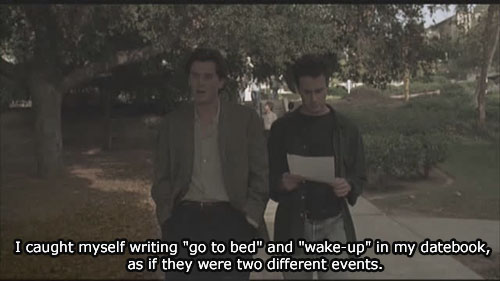It’s nearly summertime and for many of us that means heading back to our hometown for a visit. I grew up in rural Virginia and supposedly hated it so much I had to graduate from high school a year early just to get away faster. The irony, or beauty, of it all is that I’ve spent my entire adult life being proud of that rural upbringing, contrasting it to the urban life I now live, and basically feeling sure that everyone and everything I am was born in those formative years out in the mountains. That landscape and those experiences made a bit of a psychic imprint, one I'm possibly going to spend forever contemplating. I return back East at least twice a year, an occasion I always look forward to with near frantic anticipation. The seasons! The back roads! The sky! Returning home is an evocative journey, one chock full of nostalgia, symbolism, projection, idealization, reflection and other monumental ingredients. For me, being home always has a different soundtrack, wardrobe and catalogue of sensation than being in my regular life. I listen to old mixes, scour old journals, photo albums and thrift shops. I go to bed well before midnight, contemplating my life, past and present, full of an unnameable kind of longing. Occasionally I see an old boyfriend or almost-was-boyfriend. It’s all perfect. Everything is exactly as I remember, just moved one half-centimeter to the left and therefore fundamentally different as well. So there’s this mixed up jumble of being wildly comforted and discomfited simultaneously, like you’re in an off-kilter dream.
In the movies, the need to come home is usually more dramatic than merely an annual summer sojourn. There are reunions, deaths, and oftentimes unfinished business with parents, siblings, friends or lovers. Sometimes decades have passed since the last visit. The need to take stock is the consistent through-line, and this is facilitated by an isolation from the life you’ve created for yourself, while simultaneously being immersed in the one you were born into, where you spent your first 18 or so years. In this surreal state you’re able to consider the full magnetism and scope of your life, the passage of time and who you’ve become.

In Young Adult, Mavis Gary, a hot mess of a former popular girl and currently a ghost writer of young adult novels, heads home to steal her high school boyfriend from his wife. Charlize Theron is awesome as Mavis, with her desperate prettiness, dark fingernails and proclivity to take shots. The movie is cynical and non-feel-good. Being home offers few lessons or redemption and instead is the catalyst that pushes Mavis to near (or actual) breaking point. How refreshing! It also turns on its head the well-worn assumption (cinematically and otherwise) that city life is glamorous and fantastic while small town life is depressing and plebeian.
Which leads us to Beautiful Girls, where a young, hot Timothy Hutton ends up back at home for a high school reunion. It’s all about not being where you thought you’d be and how first that’s incredibly depressing and then it’s OK because life isn’t about being where you thought you’d be. Beautiful Girls has all of the heading home for a visit touchstones; an alienated father, a whimsical new connection (albeit vaguely Lolita-ish, but that’s OK) and old friends (Matt Dillon as the popular boy fallen from grace, now a snow plow driver in a Hüsker Dü shirt: classic!). I re-watched the first 20 or so minutes as “research” for this piece and it has a sort of wonderful '90s feel to it, but definitely amps up the small-town-life-will-crush-your-soul themes. It got me thinking that I couldn’t come up with a protagonist who returns to an urban home. This brings up some interesting questions about place, identity and lifestyle, the narrative function of “escape” and where we're escaping from/to.
The closest I could come to someone returning to an urban home is The Royal Tenenbaums, which takes place in a theatrical fairy tale version of New York City. The Tenenbaum siblings all end up at home after their father fakes cancer in order to win their mother back. This isn’t as much about the contrast of place or landscape as it is about the contrast between a hyper-successful childhood and the ensuing adult ennui. Housed in the lovely, self-conscious world of Wes Anderson, is a somewhat classic tale of the emotions and identity struggles of returning to the fold of your family (with some flourishes such as falling in love with your brother) and considering what it really means to be successful.

In Kicking & Screaming (side note, this is one of my top five favorite movies of ALL TIME) a group of college friends aren’t exactly going home so much as refusing to leave. Much like Young Adult, though in a different way, this movie is about prolonged adolescence…one of my favorite topics and states to inhabit. I'll take any reason to talk about Kicking & Screaming, a hilarious tale of cute boys who don’t want to leave behind their college years so they move in together (or in with their mom) and do things like start book clubs, date teenagers, hang out at their same spots and feel nostalgic for conversations they had yesterday.
A few others that must be mentioned: There's the lovely (and I feel like no one saw it?) Winter Passing where Zooey Deschanel returns home to find the love letters her father, a JD Salinger-ish character from whom she is estranged, wrote for her mother. In Tiny Furniture, pre-Girls Lena Dunham stars with her actual mother as a girl who moves home between college graduation and figuring out what to do next, capturing very well the half-magical, half-completely awful time when, even though you’re 22, you only want to crawl in bed with your mom and have her tell you that everything is going to be OK. And, of course, Son-in-Law, the Pauly Shore movie of the early '90s, about a farm girl who brings home her wacky boyfriend from UCLA, a classic that sums up all the discord, contrast and magic that coming home entails. And, of course, I've already discussed the perfection of Grosse Pointe Blank.

